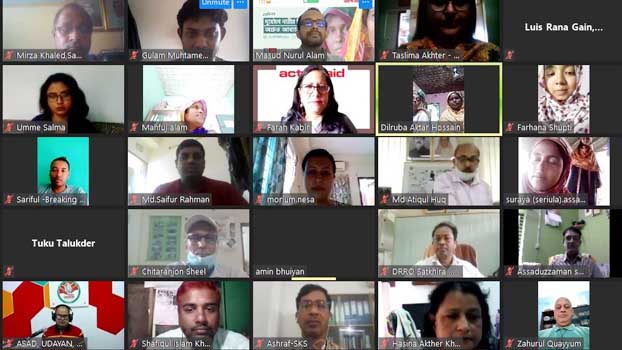Women at most risk during disaster

Bangladesh is a disaster-prone area due to its geographical location. According to the Global Climate Risk Index 2019, Bangladesh ranks ninth among the top 15th countries at risk due to natural disasters. Women and children are at most risk during disasters.
Of the 3.3 million people affected by the long-lasting flood this year, 52% were women. The joint blow from corona and Amphan have made the women in the south-west region of the country suffer even more. Out of 2.6 million people affected by cyclone Amphan in 19 districts, 8 lakh 20 thousand were women including 49 thousand 316 pregnant women.
Participatory Research Action Network-PRAN and ActionAid Bangladesh in collaboration with UNFPA, organized a webinar titled ‘Women’s Vulnerability in Disaster: Unheard Voices’ on Thursday to explore effective strategies to prevent violence against women during disaster and post disaster crisis.
Farah Kabir, Country Director of ActionAid Bangladesh chaired the webinar while Mr. Md. Atiqul Haque, Director General of Disaster Management and Kamrun Nahar, Deputy Director of Department of Women’s Affairs joined as honorable guests.
Mentioning the draft action plan 2021-2015 presented for disaster management, Atiqul Islam said that the Government is working on how to involve women, children and differently abled people in disaster management based on the current context. This year they had to deal with flood four times along with Corona Pandemic.
“Separate corner is being set up for women in new Cyclone Centres and the disaster management department is going to purchase 60 rescue boats soon considering the needs of women and children in particular”, he added.
“Although there is no separate management system for women, we provide disaster management trainings through different projects for them’, said Kamrun Nahar, Deputy Director of Department of Women Affairs.
In her speech as chair Farah Kabir, Country Director of ActionAid Bangladesh said, “We have seen that there were not sufficient protective measures for women during Cylone Sidr. Now a lot has changed. The shelter homes have also undergone structural changes with women's safety in mind, for which NGOs, including civil society, have been working hard”.
Mentioning that the shelter should be made women friendly as well as women should take the lead of the shelter for themselves, Farah Kabir further said, “Bangladesh is far ahead in dealing with disasters. But we have to admit that there is violence against women during disasters. Psychosocial counseling needs to be provided to build women's confidence in dealing with disasters. We need to work together on women's health and reproduction during disasters, as well as implement and enforce policies and laws”.
“Women and men do not face the same problems in disasters. Women's vulnerability increases many times over in any disaster, and so does the risk to women's safety," said Shamima Parveen, UNFPA's programme specialist.
Dhaka University Professor Dr. Shahnaz Huda and Mansura Hossain, Senior Reporter of Daily Prothom Alo, participated as Panel discussants in this virtual event.
Shampa Goswami from Prerona, Fatima Parvin, Upazilla Vice Chairman of Patharghata in Barguna, Tuku Talukder, Chairman of Greenhil Rangamati, Md Lutfur Rahaman, Executive Director of CCDF Kurigram, Jahurul Qayyum and others joined the webinar as district level discussants.
Including adopting long-term plan for disaster prevention, in addition to respond to disaster or post disaster, which will reduce violence against women during the preparation, disaster and response; multipurpose cash arrangements for women in response activities; adopting long-term plans to ensure women's access to economic activities at normal times and a number of other proposals have been put forward including planning at several levels and taking steps considering the real situation of women.





